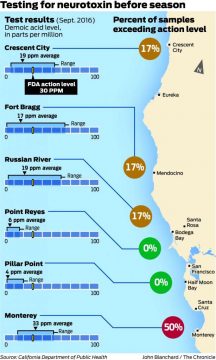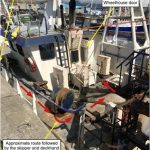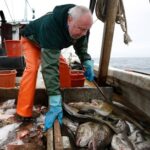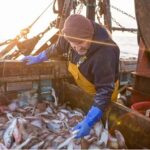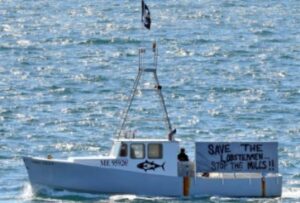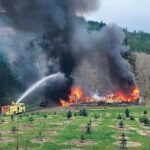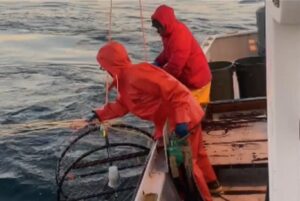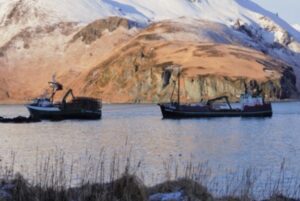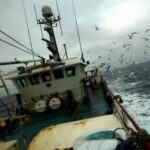Daily Archives: September 29, 2016
Real Reality – Men in the water on Deadliest Catch: Dungeon Cove
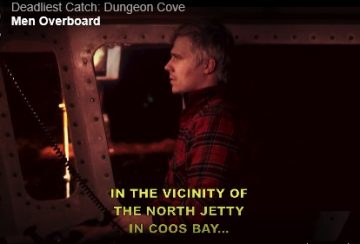 Last nights showing of Dungeon Cove brought reality to the forefront of the viewing public when they interjected the tragedy of the fishing vessel Eagle III into the program. The Coast Guard put an alert out over the radio advising of three men in the water and they ask all mariners to keep an eye out for them and report any sightings. We posted some of the heartbreaking articles here, and the comments made by many were of shock, sadness, and despair as fishermen and friends reacted. Of course, there was also generosity through fundraisers to bring aid for those left behind and prayers. Lots of prayers. It’s what we do. This reality show is as close to it as it comes, and the emotion of the people America is watching is on display, uninhibited. This is the link to the articles we posted, and this link takes you to an article with a short video trailer. The Coast Guard alert is hair raising like it always is. Reality. 20:46
Last nights showing of Dungeon Cove brought reality to the forefront of the viewing public when they interjected the tragedy of the fishing vessel Eagle III into the program. The Coast Guard put an alert out over the radio advising of three men in the water and they ask all mariners to keep an eye out for them and report any sightings. We posted some of the heartbreaking articles here, and the comments made by many were of shock, sadness, and despair as fishermen and friends reacted. Of course, there was also generosity through fundraisers to bring aid for those left behind and prayers. Lots of prayers. It’s what we do. This reality show is as close to it as it comes, and the emotion of the people America is watching is on display, uninhibited. This is the link to the articles we posted, and this link takes you to an article with a short video trailer. The Coast Guard alert is hair raising like it always is. Reality. 20:46
Final BP seafood settlement payments a milestone
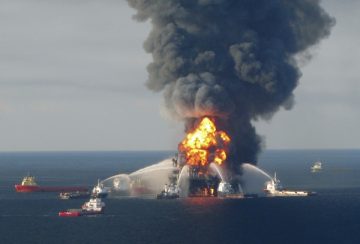 BP’s oil spill settlement with private individuals and businesses hit a major milestone this week as the court-appointed claims administrator announced the final round of payments to those most directly affected by the 2010 disaster, fishermen and seafood businesses. The third and last round of payments in the settlement’s $2.3 billion seafood compensation fund totals $520 million, and claims administrator Patrick Juneau said payment letters will go out next week. He says that will provide a major influx of money into the coastal economy for shrimpers, crabbers, oystermen and fin fishermen. Juneau, whom BP once accused of “hijacking” the settlement and barraged with personal attacks for the balance of two years, says this final step is a hard-earned result of BP and plaintiff’s lawyers turning over a new leaf and working together. But a coalition of fishing leaders called GO Fish remains disappointed with the slow pace of claims payments. There was also a hiccup last December when hundreds of fishing claimants were identified as potential fraud cases, a mistake that scared people on Christmas Eve and wasn’t resolved for several months. Read the story here 18:57
BP’s oil spill settlement with private individuals and businesses hit a major milestone this week as the court-appointed claims administrator announced the final round of payments to those most directly affected by the 2010 disaster, fishermen and seafood businesses. The third and last round of payments in the settlement’s $2.3 billion seafood compensation fund totals $520 million, and claims administrator Patrick Juneau said payment letters will go out next week. He says that will provide a major influx of money into the coastal economy for shrimpers, crabbers, oystermen and fin fishermen. Juneau, whom BP once accused of “hijacking” the settlement and barraged with personal attacks for the balance of two years, says this final step is a hard-earned result of BP and plaintiff’s lawyers turning over a new leaf and working together. But a coalition of fishing leaders called GO Fish remains disappointed with the slow pace of claims payments. There was also a hiccup last December when hundreds of fishing claimants were identified as potential fraud cases, a mistake that scared people on Christmas Eve and wasn’t resolved for several months. Read the story here 18:57
Culvert design aimed at saving salmon in Langley Township
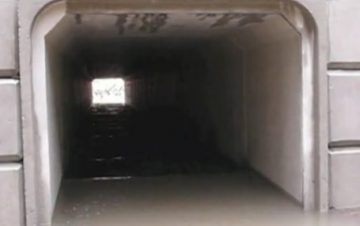 Nat Cicuto carefully picks his way down the gravel slope on the south side of the new 86 Avenue culvert to reach the bank of Yorkson creek. It’s a grey, rainy day, and the muddy water is moving fast through the just-installed precast concrete box beneath the road that connects 204 Street to 205B Street. Cicuto, president of the Yorkson Watershed Enhancement Society, has to raise his voice to be heard over the sound. “This is huge,” he says, smiling. “We’re gaining about 100 metres of spawning habitat.” The replacement for the old culvert under the road has opened up the waterway and comes with fish baffles inside that will serve as habitat for wild Pacific coho salmon, he explains. Cicuto calls it a “history-making design” that will protect the fish from people and predators. Video, read the rest here 18:13
Nat Cicuto carefully picks his way down the gravel slope on the south side of the new 86 Avenue culvert to reach the bank of Yorkson creek. It’s a grey, rainy day, and the muddy water is moving fast through the just-installed precast concrete box beneath the road that connects 204 Street to 205B Street. Cicuto, president of the Yorkson Watershed Enhancement Society, has to raise his voice to be heard over the sound. “This is huge,” he says, smiling. “We’re gaining about 100 metres of spawning habitat.” The replacement for the old culvert under the road has opened up the waterway and comes with fish baffles inside that will serve as habitat for wild Pacific coho salmon, he explains. Cicuto calls it a “history-making design” that will protect the fish from people and predators. Video, read the rest here 18:13
Canada Plays Leadership Role in Protecting Key Fish Stocks and Ecosystems in the Northwest Atlantic Ocean
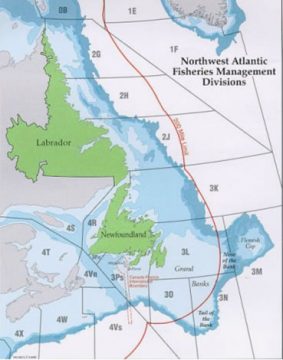 Canada expressed its strong support for science advice and strict management measures that protect straddling fish stocks in the Northwest Atlantic at the 38th annual meeting of the Northwest Atlantic Fisheries Organization (NAFO) in Varadero, Cuba last week. Quick Facts – The Canadian quota for 2+3KLMNO Greenland halibut in waters off the coast of Newfoundland and Labrador was set at 5,478 tonnes for 2017, which is a rollover from 2016. – The Canadian quota for 3LN redfish in waters off the east coast of the island portion of Newfoundland and Labrador was increased by 1,619 tonnes to 6,049 tonnes for both 2017 and 2018. – The Northwest Atlantic Fisheries Organization (NAFO) is an international regional fisheries management organization (RFMO) founded in 1979. NAFO’s overall purpose is to help its members work together and share knowledge to effectively manage and conserve the straddling fishery resources of the Northwest Atlantic Ocean. Read the press release here 16:56
Canada expressed its strong support for science advice and strict management measures that protect straddling fish stocks in the Northwest Atlantic at the 38th annual meeting of the Northwest Atlantic Fisheries Organization (NAFO) in Varadero, Cuba last week. Quick Facts – The Canadian quota for 2+3KLMNO Greenland halibut in waters off the coast of Newfoundland and Labrador was set at 5,478 tonnes for 2017, which is a rollover from 2016. – The Canadian quota for 3LN redfish in waters off the east coast of the island portion of Newfoundland and Labrador was increased by 1,619 tonnes to 6,049 tonnes for both 2017 and 2018. – The Northwest Atlantic Fisheries Organization (NAFO) is an international regional fisheries management organization (RFMO) founded in 1979. NAFO’s overall purpose is to help its members work together and share knowledge to effectively manage and conserve the straddling fishery resources of the Northwest Atlantic Ocean. Read the press release here 16:56
Construction of subsea power cable for Cutler Naval Communications Station has Scallopers concerned
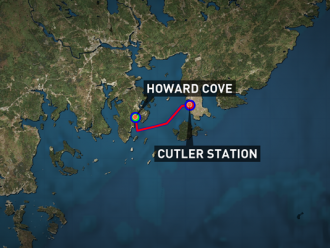 Fishermen in Machias Bay are on alert as the construction of a subsea power cable is set to get underway. Some met with representatives from the Navy and firms involved in the project in East Machias Monday night to clarify the final plan. “We’ve been in contact with the fishing community starting and throughout the design and environmental review process—so prior to the award of the project,” Kari Moore an environmental planner with the Navy said. Fishermen are worried about how the cable will be classified. They fear it will restrict fishing in parts of the bay. Their primary concern: dredging for scallops in a prime location. “If it gets classified a certain way as a cable area itself, we will lose a lot of bottom, but it’s not a safety concern where it’s buried,” said fisherman Michael E. Murphy. Video, read the story here 14:53
Fishermen in Machias Bay are on alert as the construction of a subsea power cable is set to get underway. Some met with representatives from the Navy and firms involved in the project in East Machias Monday night to clarify the final plan. “We’ve been in contact with the fishing community starting and throughout the design and environmental review process—so prior to the award of the project,” Kari Moore an environmental planner with the Navy said. Fishermen are worried about how the cable will be classified. They fear it will restrict fishing in parts of the bay. Their primary concern: dredging for scallops in a prime location. “If it gets classified a certain way as a cable area itself, we will lose a lot of bottom, but it’s not a safety concern where it’s buried,” said fisherman Michael E. Murphy. Video, read the story here 14:53
It’s time to talk crab season projections – NPFMC to meet to approve catch limits, discuss management plan
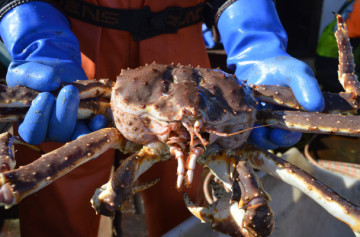 The North Pacific Fishery Management Council will meet in Anchorage from Oct. 5-11 to overview crab season projections, hear further discussions of halibut management, and decide what to do about a recent federal appeals court decision that will require more attention to salmon management. The council will approve catch limits for the 2016-17 crab fisheries and review the stock assessment for the last year. Stocks for both snow crab and Bairdi Tanner crab were down according to surveys in 2016, and stakeholders are holding their breath to see if the Alaska Department of Fish and Game will need to close fisheries if abundance doesn’t meet the department thresholds. The crab fishing management plan, or FMP, requires federal scientists to set an overfishing limit, or OFL, and an acceptable biological catch, or ABC. Based on these numbers, the Alaska Department of Fish and Game will determine a total allowable catch, or TAC, under its joint management with the council. Read the story here 14:13
The North Pacific Fishery Management Council will meet in Anchorage from Oct. 5-11 to overview crab season projections, hear further discussions of halibut management, and decide what to do about a recent federal appeals court decision that will require more attention to salmon management. The council will approve catch limits for the 2016-17 crab fisheries and review the stock assessment for the last year. Stocks for both snow crab and Bairdi Tanner crab were down according to surveys in 2016, and stakeholders are holding their breath to see if the Alaska Department of Fish and Game will need to close fisheries if abundance doesn’t meet the department thresholds. The crab fishing management plan, or FMP, requires federal scientists to set an overfishing limit, or OFL, and an acceptable biological catch, or ABC. Based on these numbers, the Alaska Department of Fish and Game will determine a total allowable catch, or TAC, under its joint management with the council. Read the story here 14:13
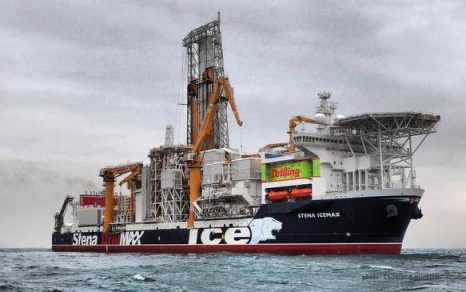
Shell Canada offshore drilling incident too close for comfort in area near rich fishing grounds
When heaving waters in the North Atlantic wrenched a string of massive steel pipes from a drilling ship off Nova Scotia’s coast, one of the 20-tonne sections of the plummeting coil struck the seabed just 12 metres from the top of an undersea oil exploration well. The distance is one of several details in a Shell Canada accident report received through access to information legislation, prompting critics to say the entire incident was too close for comfort in an area near one of Atlantic Canada’s richest fishing grounds of the Scotian Shelf. A summary report by the regulator issued earlier this year had said a heavier portion of the drilling system fell 22 metres from the wellhead, but didn’t mention the closer distance of pipes that are coiled and criss-crossed through an area of seabed the size of three football fields in length and breadth. Read the story here 12:32
Missing fish catch data? Not necessarily a problem, new study says
 Recording how many fish are caught is one important requirement to measure the well-being of a fish stock — if scientists know the number of fish taken from the ocean, they can adjust management of that fishery to keep it from being overfished. Missing , however, are rampant, causing concern that fisheries around the world are overfished. A new study by University of Washington scientists finds that in many cases, this isn’t true. Specifically, misreporting caught fish doesn’t always translate to overfishing. The study was published online this month in the journal Fish and Fisheries. “While quantifying total catch is important for understanding how much is removed from the system, it is possible to manage sustainably even if we don’t know those numbers,” said lead author Merrill Rudd, a UW doctoral student in aquatic and fishery sciences. “This paper shows there are some situations where, just because there is unreported catch, it doesn’t mean we are overfishing.” Read the article here 11:56
Recording how many fish are caught is one important requirement to measure the well-being of a fish stock — if scientists know the number of fish taken from the ocean, they can adjust management of that fishery to keep it from being overfished. Missing , however, are rampant, causing concern that fisheries around the world are overfished. A new study by University of Washington scientists finds that in many cases, this isn’t true. Specifically, misreporting caught fish doesn’t always translate to overfishing. The study was published online this month in the journal Fish and Fisheries. “While quantifying total catch is important for understanding how much is removed from the system, it is possible to manage sustainably even if we don’t know those numbers,” said lead author Merrill Rudd, a UW doctoral student in aquatic and fishery sciences. “This paper shows there are some situations where, just because there is unreported catch, it doesn’t mean we are overfishing.” Read the article here 11:56
St. George lobsterman charged in sinking of rival’s boat
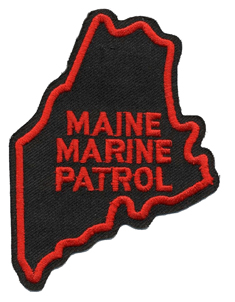 According to documents filed in Knox County Unified Court, Alan B. Norwood, 47, of St. George, was charged with aggravated criminal mischief, class C, for allegedly paying two others, Vincent Hilt, 22, of Vinalhaven, and Devin Meklin, 20, of Warren, to sink a boat owned by another lobsterman, Josh Hupper. In interviews at Knox County Sheriff’s Office, Hilt and Meklin admitted to stealing the skiff and using it to get out to Hupper’s boat, which they then sank. They said Norwood had offered them $500 to sink the boat. Both have been charged with aggravated criminal mischief and theft. Norwood had told the Marine Patrol that he did not pay anyone to sink Hupper’s boat. A search warrant was issued Sept. 9 for the Marine Patrol to examine cell phone records,,, Read the story here 11:27
According to documents filed in Knox County Unified Court, Alan B. Norwood, 47, of St. George, was charged with aggravated criminal mischief, class C, for allegedly paying two others, Vincent Hilt, 22, of Vinalhaven, and Devin Meklin, 20, of Warren, to sink a boat owned by another lobsterman, Josh Hupper. In interviews at Knox County Sheriff’s Office, Hilt and Meklin admitted to stealing the skiff and using it to get out to Hupper’s boat, which they then sank. They said Norwood had offered them $500 to sink the boat. Both have been charged with aggravated criminal mischief and theft. Norwood had told the Marine Patrol that he did not pay anyone to sink Hupper’s boat. A search warrant was issued Sept. 9 for the Marine Patrol to examine cell phone records,,, Read the story here 11:27
Dungeness crab get qualified thumbs-up in tests for domoic acid
The fate of the Dungeness crab season will hang on the test results coming out of an East Bay lab. With the beginning of the season approaching in November, the California Department of Public Health has begun safety tests on Dungeness crab a few weeks earlier than usual. Dungeness crab samples collected from Crescent City (Del Norte County) all the way down to Monterey are filing in to the Food and Drug Laboratory Branch in Richmond, where they are tested for domoic acid, the naturally occurring but potentially devastating neurotoxin that wreaked havoc on last year’s season. So far, results are normal for this time of year, said Patrick Kennelly, chief of food safety at the state health department — even though crabs from four of six regions are testing positive for domoic acid. But you can be sure that crabbers, as well as officials from the departments of public health and fish and wildlife, are watching the results closely, with Dungeness crab season due to start Nov. 5 for recreational fishers and Nov. 15 for commercial crabbers. Read the story here 09:42
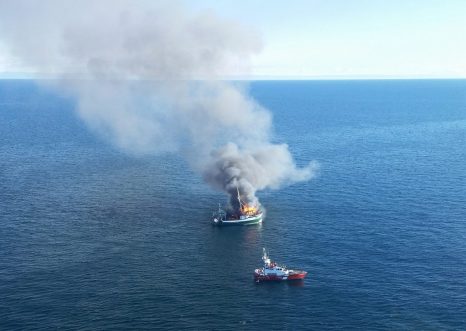
Four fishermen rescued by fishing boat off Newfoundland when boat burns
Four fishermen are safe today after a rescue at sea from a burning boat about 50 kilometres off the coast of Newfoundland’s northern peninsula. The fishermen from the Atlantic Provider were brought back to Port aux Choix Wednesday afternoon on board the fishing vessel Avalon Voyager. The Avalon Voyager was close by when the distress call was issued and steamed to the aid of the burning vessel. Capt. Liam Mather of the rescue co-ordination centre says a cormorant helicopter was sent from Gander but didn’t participate in the rescue. He says the helicopter returned to its base after the Avalon Voyager took the fishermen on board. Link 08:10






